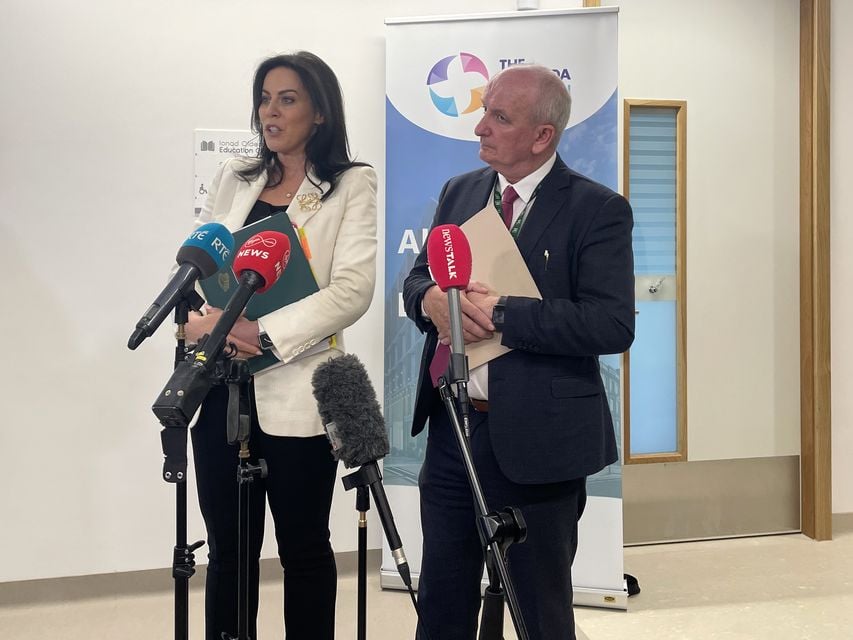The launch of a national health app has been called a milestone that will help people “navigate the health service”.
But an opposition TD has criticised it as a reminder of “how far behind we are” in developing a modern, digitally integrated health service.
The HSE Health App is part of a health digitisation strategy launched for 2024-2030, and comes 12 years after Ireland’s first eHealth strategy was launched.
Currently, people can use the app to find information about health conditions and HSE services, or if they have a verified MyGovID account, they can access further services.
These include being able to view flu and Covid-19 vaccination records, maternity appointments, and a list of medicines received through the Drugs Payment Scheme or Medical Card Scheme.
Among the main benefits of the digitisation outlined during the pilot was expectant mothers being able to view their appointments shortly after booking them and “significant safety improvements” in terms of a reduction in the risk of medication errors.
There will be three updates to the app this year, and the HSE said that by the end of 2025 the majority of public patients will be able to view their HSE appointments on the app.
Among the services that will be part of the next rollout would be next appointment notifications and reminders, pre and post-appointment information, screening appointments starting with BreastCheck, and information on waiting times and referrals.
There will also be notifications sent when vaccinations are due and reminders if their medical card is due to expire.
As part of future services, patients will be able to tap their phone to check in at a healthcare facility, “as you would pay for something in a shop”.
The HSE is also working with Government officials to integrate the HSE Health App with the Government Digital Wallet, which will be released later this year.
Health Minister Jennifer Carroll MacNeill and HSE chief executive Bernard Gloster at the launch of the HSE’s health app (Grainne Ni Aodha/PA)
HSE chief executive Bernard Gloster said the app is “significant” because it would “empower” patients by giving them better access to their own health information.
“It is also important because it is a key component to empowering patients, to empowering the public about their information, about their health service, about their health service for them.”
He said it was the “first real significant step in the modern era of our application of the new digital framework for health” and said a business case would be sent to Government on setting up a system for electronic health records.
Mr Gloster said he had often been questioned at committees about how “terrible” Ireland’s health services are at technology and digitisation.
He said: “Of course, we accept very much there is a challenge for us in terms of how timely we are at implementation, and how good we are at exploiting the potential of the worlds of digital for the appropriate benefit of the public and of public service, and in our case, patients and service users.
“While I hope that at least for today, that as much as those difficult questions are asked about me and asked of the minister and indeed, of the Government, I just hope that today also there will be a recognition of just what has been achieved, what is being launched here and what is being celebrated here.”
Minister for Health Jennifer Carroll MacNeill said the Government was committed to funding the app and digitisation strategy over the coming years and said she had already seen “great support” from her Government colleagues to “invest in Irish people’s health”.
She added: “I certainly am.
“Of course I have to make the case to my Government colleagues for a range of funding for major infrastructure projects that I will be making the strongest case that I can for funding for digital health, for funding for the elective hospitals that we want to build, for funding for the new National Maternity Hospital that we want to build.
“I take a very clear view that we don’t want to be doing these projects one after the other, that we need an investment in health to make this once-off infrastructure leap that I believe is necessary and appropriate, that I believe is covered in the Programme for Government, to be able to deliver the services that we need now and we know we will continue to need.”
Asked if it was a priority for this Government, she said: “Absolutely, yes.”
Asked about the 2021 ransomware attack which affected HSE services, HSE representatives said it had used “best of class security and validation” to make sure the app is secure.
A qualitative analysis was done by external sources, one from a cloud-based business and another from a specialist company, ensuring that security and privacy was “at the heart of it”.
The cost of developing the app was 4.5 million euros and cyber security cost 1.4 million euros, bringing it to a total of 5.9 million euros – but HSE staff emphasised that continuous investment would be needed to maintain its services.
HSE’s chief technology and transformation officer Damien McCallion said that a seven-year timeline for a full digitisation of the health service was a reasonable time frame.
